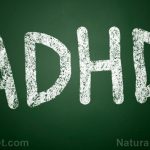
STAMP OUT DEPRESSION and ANXIETY with these 10 key supplements that boost dopamine naturally
Wednesday, December 18, 2024 by S.D. Wells
http://www.naturalnewsnutrients.com/2024-12-18-stamp-out-depression-and-anxiety-10-key-supplements-boost-dopamine.html

- Dopamine plays a crucial role in regulating motivation, mood, and energy levels in the brain, impacting decision-making, self-esteem, and sleep patterns.
- Lifestyle factors can cause dopamine levels to drop, affecting daily functioning and perception of accomplishments.
- Key supplements offer a natural way to boost dopamine levels without side effects or addiction, providing control over mental well-being.
- Probiotics, Ginkgo Biloba, Curcumin, Oregano Oil, Magnesium, Amino acid L-theanine, Vitamin D, Fish oil, Hemp seed oil, and Mucuna Pruriens are supplements that enhance dopamine production and mood regulation.
- Ginseng, particularly Korean red ginseng, shows promise in improving attention in children with ADHD by increasing dopamine levels, highlighting its potential in enhancing brain function and mood.
As we all know by now, dopamine is a chemical in the brain that plays a major role in the regulation of motivation, mood and energy levels. Dopamine also aids in decision making, self-esteem, and sleep regulation. This means that how you function all day and how you perceive your own accomplishments can be affected by dopamine levels in the brain and body. This deserves careful consideration.
Under normal circumstances, dopamine production is managed quite well by your body’s nervous system, but there are lifestyle factors that can cause dopamine levels to plummet, and without knowledge of how to change this, those levels can remain low, drained, and almost non-existent. These factors include consumption and overuse of sugar, alcohol, nicotine, prescription drugs, street drugs, junk food, and much more.
The good news is, the pendulum swings the other way too, and you have COMPLETE CONTROL over this. How’s that, you ask? That’s where key supplements come into play, and most medical doctors, psychiatrists and psychologists are not trained to give you proper advice in this realm, nor does the American Medical Association appreciate it when and if they do. Why?
Because the right supplements can boost your dopamine levels naturally, with no crash, no addiction, no prescription-drug-style side effects, and you can maintain those levels by simply ramping up your nutrient intake.
The 10 key supplements that boost dopamine naturally and altogether cost less than a diagnostic exam to tell you your levels are low
- Probiotics: The good gut bacteria that increase dopamine production, improving mood and reducing anxiety. Studies show benefits for mood disorders and irritable bowel syndrome, highlighting the importance of probiotics in enhancing overall well-being.
- Ginkgo Biloba: Ancient remedy with the potential to boost dopamine levels in rats, enhancing cognitive function and memory. While further research is needed for human application, the preliminary studies hint at its mood-improving qualities.
- Curcumin: Active in turmeric, curcumin is a natural antidepressant that increases dopamine release. Comparable to Prozac in improving mood, it shows promise in elevating dopamine levels, although more research is required for human confirmation.
- Oregano Oil: Antioxidant-rich oil that promotes dopamine production and exhibits antidepressant effects in mice. While human studies are lacking, the benefits seen in animals hint at its potential for mood enhancement.
- Magnesium: Vital for mental health, magnesium deficiency may lead to decreased dopamine levels and increased depression risk. Supplementing with magnesium has shown to boost dopamine levels and provide antidepressant effects in animal studies.
- Amino acid L-theanine: Found in green tea, L-theanine increases dopamine production, offering an antidepressant effect and cognitive enhancement. Green tea consumption is linked to lower depressive symptoms, emphasizing its mood-boosting properties.
- Vitamin D: Regulates neurotransmitters like dopamine, with studies showing improved levels with vitamin D supplementation. While promising in animal studies, further human research is needed to understand the impact on dopamine levels.
- Fish oil and hemp seed oil supplements: Rich in omega-3 fatty acids, these supplements have antidepressant effects and influence dopamine regulation. Studies suggest a significant increase in dopamine levels in the brain, highlighting their potential in treating depressive symptoms.
- Ginseng: a staple in traditional Chinese medicine, offers various forms for consumption, from raw to capsules. Studies suggest its potential to enhance brain skills, mood, behavior, and memory by increasing dopamine levels. Research on Korean red ginseng shows promising results in improving attention in children with ADHD by boosting dopamine levels.
- Mucuna Pruriens: Contains levodopa, essential for dopamine production, making it effective in boosting dopamine levels. A superfood known as a nutraceutical or nootropic, Mucuna pruriens shows antidepressant effects and mood enhancement in clinical trials for both humans and animals.
Speaking of Mucuna pruriens, there’s a new cutting-edge product that contains this powerful nootropic and it’s medically proven to reduce stress and anxiety
Millions of Americans have been waiting for a product that’s convenient, inexpensive, and effective at reducing or eliminating stress, anxiety and depression, without having to go to the doctor, get a prescription, and then worry about side effects and “adverse events” listed on the package insert or the bottle. Wait no longer.
Dr. Mahsin Habib, inventor of “The Executive Physical,” has partnered up with a natural remedy expert to bring the world a tasty mint chewing gum that contains one of the world’s most potent forms of L-dopa, the precursor to natural dopamine production. He calls it “Next Level Gum” and it contains Mucuna pruriens, also known as the “velvet bean” and “purple magic.”
Ready for a natural dopamine boost you can take with you anywhere and take your mood, focus and motivation to the next level? Check out Next Level Gum, and don’t forget to tune your internet dial to NaturalMedicine.news for more tips on how to use natural remedies for positive lifestyle influence. #NextLevelGum
Sources for this article include:
Tagged Under: Tags: Anxiety, anxiety supplements, beat depression, brain function, brain health, depression, depression supplements, dopamine boost, Mucuna pruriens, natural dopamine, natural medicine, next level gum, nutrients, prevention, remedies, stress, stress supplements, superfoods, supplements
RECENT ARTICLES


How modern lifestyles fuel chronic inflammation and what to do to counter it

Organic white cheddar popcorn: The perfect low-calorie, high-fiber snack
By HRS Editors

A quarter of American adults think they have ADHD: Here’s how good nutrition helps manage symptoms
By Willow Tohi

A toast to tradition: A nutritional and historical look at EGGNOG
By Zoey Sky
COPYRIGHT © 2017 NATURAL NEWS NUTRIENTS


